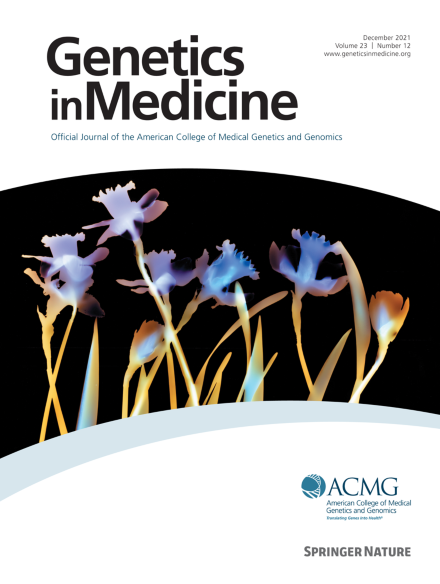不遵守卵巢癌家庭基因检测指南显示出种族偏见。
IF 6.6
1区 医学
Q1 GENETICS & HEREDITY
引用次数: 0
摘要
目的:国家综合癌症网络(NCCN)建议对有遗传性卵巢癌风险的个体进行种系基因检测。我们试图确定在多中心生物库中符合检测标准的个体的比例和特征,并适当地提供检测。方法:在这项回顾性队列研究中,我们确定了符合NCCN指南基因检测标准的麻省总医院布里格姆生物银行参与者。使用逻辑回归分析与参与者提供测试、完成测试以及具有与电子病历(EMR)中记录的自我报告相匹配的家族史相关的社会人口学因素。结果:大多数符合条件的参与者(909/1441,63.1%)没有进行基因检测。黑人或西班牙裔参与者接受测试的可能性较低。与自我报告相比,988名(68.6%)参与者的EMR记录有卵巢癌家族史。年龄较大、西班牙裔和公共保险使用与准确家族史记录的可能性降低有关。正确的文档与提供测试的可能性增加有关。结论:本研究的大多数参与者没有接受符合nccn的护理。用于遗传性卵巢癌筛查的生殖系基因检测未得到充分利用,目前获得这种检测的机会不公平。本文章由计算机程序翻译,如有差异,请以英文原文为准。
Nonadherence to guidelines for genetic testing in families with ovarian cancer shows racial bias
Purpose
The National Comprehensive Cancer Network (NCCN) recommends germline genetic testing for individuals at risk for hereditary ovarian cancer. We sought to determine the proportion and characteristics of individuals meeting testing criteria in a multicenter biobank who were appropriately offered testing.
Methods
In this retrospective cohort study, we identified Mass General Brigham Biobank participants meeting genetic testing criteria per NCCN guidelines. Logistic regression was used to analyze sociodemographic factors associated with which participants were offered testing, completed testing, and had a family history that matched their self-report documented in the electronic medical record.
Results
Most eligible participants (909/1441, 63.1%) were not offered genetic testing. Participants who were Black or Hispanic had a lower likelihood of being offered testing. Compared with self-report, 988 (68.6%) participants had a family history of ovarian cancer documented in their electronic medical record. Older age, Hispanic ethnicity, and public insurance use were associated with decreased likelihoods of accurate family history documentation. Correct documentation was associated with an increased likelihood of being offered testing.
Conclusion
The majority of participants in this study did not receive NCCN-compliant care. Germline genetic testing for hereditary ovarian cancer screening is underutilized and access to this testing is currently inequitable.
求助全文
通过发布文献求助,成功后即可免费获取论文全文。
去求助
来源期刊

Genetics in Medicine
医学-遗传学
CiteScore
15.20
自引率
6.80%
发文量
857
审稿时长
1.3 weeks
期刊介绍:
Genetics in Medicine (GIM) is the official journal of the American College of Medical Genetics and Genomics. The journal''s mission is to enhance the knowledge, understanding, and practice of medical genetics and genomics through publications in clinical and laboratory genetics and genomics, including ethical, legal, and social issues as well as public health.
GIM encourages research that combats racism, includes diverse populations and is written by authors from diverse and underrepresented backgrounds.
 求助内容:
求助内容: 应助结果提醒方式:
应助结果提醒方式:


